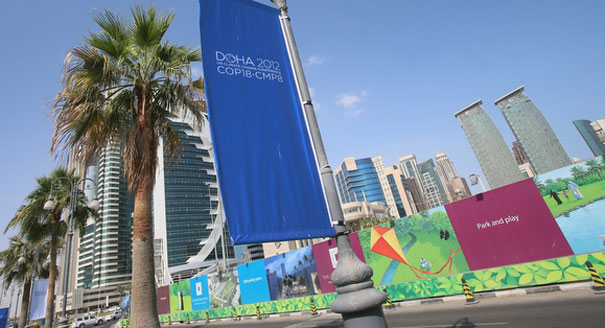Registration
You will receive an email confirming your registration.
IMGXYZ4353IMGZYXThe two weeks of negotiations for the United Nations global climate talks in Doha ended on December 8, 2012, with a series of agreements known as the “Doha Package.” Although the talks resulted in the establishment of a second commitment period for the Kyoto Protocol, they also fell short of expectations. One major factor behind this disappointment was increased distrust between developed and developing countries, especially in emerging powers like China, Brazil, and India.
Carnegie-Tsinghua’s Wang Tao co-hosted a roundtable discussion with the Beijing Energy Network to analyze the outcomes of the negotiations and prospects for future UN climate negotiations. The roundtable featured Gao Feng, legal advisor for the Chinese Foreign Ministry; Heidi Hiltunen, environmental counselor to the EU Delegation; Goerild Heggelund, senior climate change advisor to the UNDP; and Yang Fuqiang, senior climate change advisor to the NRDC. Wang and Nicola Willey, first climate secretary for the UK Embassy in China, moderated the event.
Outcomes and Expectations
At the Doha climate change talks in November, governments reaffirmed the global agreement to preserve the Kyoto Protocol while making new changes such as revisions in the financial sector.
- Impacts of Climate Change: Willey explained that carbon dioxide levels are the highest they have been in 800,000 years. The effects of this include rising global temperatures, melting ice caps in the Arctic, and changing weather patterns. She added that international supply chains are now more vulnerable to price shocks due to extreme weather conditions. Willey stated that the environment and economy were under threat, and therefore all nations had to reduce these vulnerabilities and pursue clearer, more sustainable economic growth models.
- Doha’s Achievements: Hiltunen suggested that the one of the most important achievements of the negotiations was a commitment to craft a legally binding agreement by 2015 with an enforcement mechanism set to begin in 2020. She added that the talks resulted in an agreement to establish an institutional framework for negotiations, and that they yielded pledges from EU member states to continue financial assistance to developing countries to mitigate the effects of climate change.
- Prospects Going Forward: Gao emphasized that the first priority of all policymakers should be the continuation of the Kyoto Protocol because it has served as the foundation for other agreements. He added that tougher negotiations needed to happen around technology transfers, capacity building, and financing. These were the issues that concerned developing countries and would persist if not addressed, he added.
Nongovernmental Organizations Dissatisfied
Although various agreements were reached, environmental NGOs are largely dissatisfied with the results, participants agreed.
- Economy Trumps Environment: Yang highlighted that NGOs were overall dissatisfied with how governments prioritized economic matters over the development of environmental resources. The political will behind climate change is not strong enough, he explained, and there is no clear plan to increase the emissions cap. Yang added that there remained a “gap of trust” between developing and developed countries.
- Lack of Leadership: Yang stated that the Doha negotiations lacked leadership. In response to a question regarding the future of China’s role in climate change talks, Yang observed that China should play a more positive and aggressive role in the next round of negotiations.
China’s Position on Climate Change
Consensus holds that China, though still considered a developing country, needs to develop stronger policies for curbing climate change.
- China’s Level of Commitment Unclear: One participant commented that China’s lack of carbon emissions targets meant that it needed to commit to absolute reductions. Another panelist explained that China has already cut 1.5 million tons of CO2 since the Eleventh Five Year Plan was announced. In addition, China is investing heavily in green technology. The panelist also argued that there is no agreement on when China’s carbon emissions will peak, as the country is still growing and developing.
- Slow to Implement: The ongoing, once-a-decade political transition makes any significant change in environmental policy unlikely, discussants agreed. However, another participant argued that China, as a vibrant emerging economy, has increasing capacity to take action. She added that the status of a developing country was not static. As these countries develop, their capacity to effect change and implement policies to curb the effects of climate change will also develop.
Discussants: Gao Feng, Heidi Hiltunen, Goerild Heggelund, Yang Fuqiang, Nicola Willey
